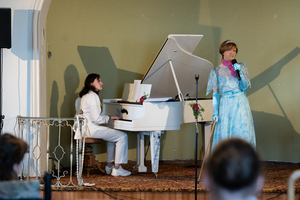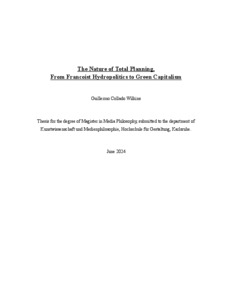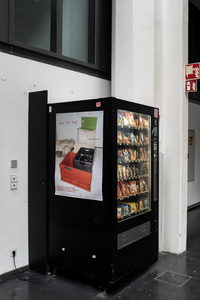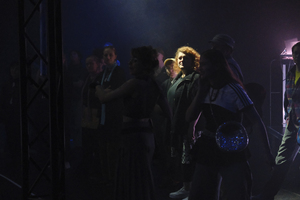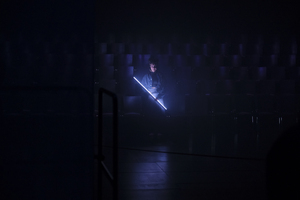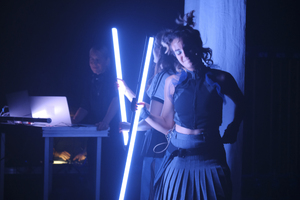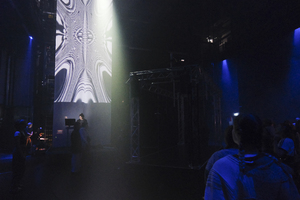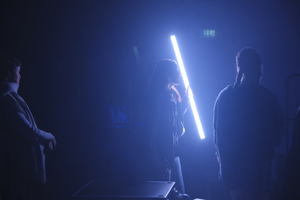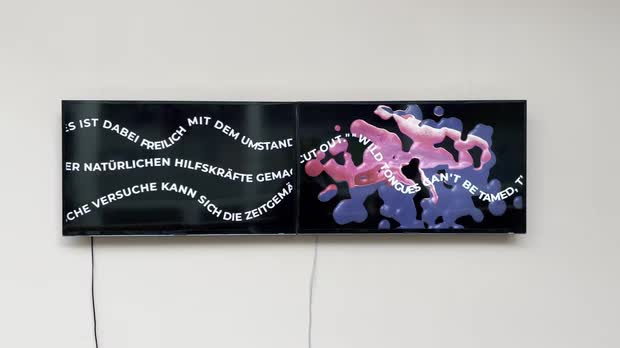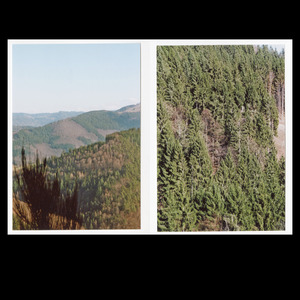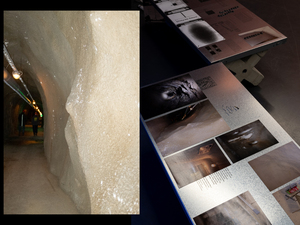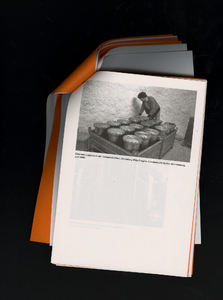"Sommersemester 2024"
| Begriff | Sommersemester 2024 |
| Metakey | Semester (institution:semester) |
| Typ | Keyword |
| Vokabular | HfG |
264 Inhalte
- Seite 1 von 22
Ghosts of Grand Hotels
- Titel
- Ghosts of Grand Hotels
- Autor/in
- Beschreibung (de)
- Geister von Grand Hotels
Willkommen im Grand Hotel, liebe Passagiere! Das Reisebüro Ghostly Matters bietet Ihnen eine saisonale Fahrt durch die weite, unheilvolle Landschaft des Schwarzwalds mitten in das Herz eines ehemaligen Grandhotels: Waldlust. Seine offenen Türen verbreiten den einzigartigen Duft von Urlaub, Klassizismus, Kunst und Luxus. Entdecken Sie mit uns die unerzählten Erzählungen seiner Wände, Möbel, Küche, Mitarbeiter und Gäste, die das Internationale mit dem Lokalen verbinden. Welche Spuren hinterlassen sich nach dem Verlassen der Zimmer im Hotel? Unser Team empfängt Sie am 5. Juli in Freudenstadt zu einem außergewöhnlichen Besuch der Ausstellungsstätte Waldlust. Die kommende Ausstellung ist die Fortsetzung einer kritischen und spielerischen Auseinandersetzung mit dem Erbe und dem zeitgenössischen Status von Grand Hotels. Welche Geister verfolgen uns in den Räumen des klassizistischen und kolonialen Luxus, in den Kammern der Fürsorge und Gastfreundschaft und in den Treffpunkten von Künstlern und wohlhabendem Bürgertum? Welche Zukünfte könnten aus einem Pool verschiedener Zeitlichkeiten entstehen? Die Ausstellung ist eine Kooperation zwischen Waldlust e.V., HfG Karlsruhe, ABK Stuttgart und Hochschule Offenburg.
- Geister von Grand Hotels
- Beschreibung (en)
- Ghosts of Grand Hotels
Welcome to Grand Hotel, dear passengers! The travel agency Ghostly Matters offers you a seasonal ride through the vast, ominous landscape of the Black Forest right into the heart of a former Grand Hotel: Waldlust. Its open doors are spreading the unique odor of holidays, classism, art and luxury. Discover with us the untold narratives of its walls, furniture, kitchen, employees and guests, that merged the international and the local. Which traces are inscribed in the hotel after the rooms are left? Our Team will welcome you on the 5th of July in Freudenstadt for a remarkable visit to the exhibition setting at Waldlust. The upcoming exhibition is the continuation of a critical and playful exploration on the legacy and contemporary status of grand hotels. Which ghosts are haunting us in the spaces of classicist and colonial luxury, the chambers of care work and hospitality and meeting places of artists and wealthy bourgeoisie? Which futures could emerge out of a pool combining various temporalities? The exhibition is a collaboration between Waldlust e.V., HfG Karlsruhe, ABK Stuttgart and Hochschule Offenburg.
- Ghosts of Grand Hotels
- Kategorie
- Typ des Projekts/Werks
- Datierung
- 25.04.2024 - 31.07.2024
- Mitwirkende
- Ort: Institution
- Ort
- Hotel Waldlust, Freudenstadt
- Stadt
- Land
- Beteiligte Institution(en)
- Titel
- Ghosts of Grand Hotels
- Titel (en)
- Ghosts of Grand Hotels
- Urheberrechtshinweis
- © Staatliche Hochschule für Gestaltung Karlsruhe, Foto: Matylda Eaton
- Rechtsschutz/Lizenz
- Freigabe Nutzung HfG
- Medienersteller/in
- Abgebildete Personen
- Projektleiter/in
- Semester
- Studiengang
- Lehrveranstaltung
- Importiert am
- 22.08.2024
- Übergeordnete Sets
- 1
The Nature of Total Planning, From Francoist Hydropolitics to Green Capitalism
- Titel
- The Nature of Total Planning, From Francoist Hydropolitics to Green Capitalism
- Autor/in
- Beschreibung (de)
- Magisterarbeit in Medienphilosophie
- Beschreibung (en)
- Thesis for the degree of Magister in Media Philosophy
- Kategorie
- Schlagworte
- Datierung
- 06.06.2024
- Sprache
- Ort: Institution
- Land
- Titel
- The Nature of Total Planning, From Francoist Hydropolitics to Green Capitalism
- Titel (en)
- The Nature of Total Planning, From Francoist Hydropolitics to Green Capitalism
- Urheberrechtshinweis
- © Guillermo Collado Wilkins
- Rechtsschutz/Lizenz
- Freigabe Nutzung HfG
- Medienersteller/in
- Medien-Beschreibung (en)
- This paper provides a critical examination of ecological planning based on the continuities that it displays across seemingly disparate political projects and historical periods. In order to do so, it draws on the small rural valley of La Bizkaia in Navarre, Spain. It produces an environmental history of the valley through a detailed study of its hydro-forestry resources, periodising such history according to a materialist reading of its ‘metabolic regimes’. That is to say, through the particular configurations between the natural and social orders that dictate life in La Bizkaia.
Initially, the study introduces the valley’s natural characteristics and its property structure, laying the foundations upon which the rest of this paper sits. Subsequently, it undertakes a detailed investigation of Francoist interventions in the 1940s-60s; a massive monoculture of pine trees was planted by the Francoist Forestry Council, which radically undermined La Bizkaia’s natural systems and depopulated it. This paper thus analyses the planning logic behind this natural intervention which, borrowing a term from one of its draftsmen, is named ‘total planning’.
The thesis then explores contemporary management of the valley by the Government of Navarre, which has maintained ownership until this day, aligning its plans with the international protocols and standards characteristic of green capitalism. By looking at projects undertaken in the valley for nature conservation and climate change adaptation, which receive funding from the European Union, this research reveals the continuities between Francoist policies and green capitalism, and how both operate under the logic of Total Planning. Under this planning logic, they both fail to accommodate the unpredictability of political conflict and natural systems.
Planning thus serves as a lens to explore the political and epistemological dimensions of ecological thought, placing a materialist reading of a small case study into the broader context of contemporary ecological intervention.
- This paper provides a critical examination of ecological planning based on the continuities that it displays across seemingly disparate political projects and historical periods. In order to do so, it draws on the small rural valley of La Bizkaia in Navarre, Spain. It produces an environmental history of the valley through a detailed study of its hydro-forestry resources, periodising such history according to a materialist reading of its ‘metabolic regimes’. That is to say, through the particular configurations between the natural and social orders that dictate life in La Bizkaia.
- Alternativ-Text (de)
- Vollständiger Text der Magisterarbeit
- Alternativ-Text (en)
- Complete text of the Magisterarbeit
- Projektleiter/in
- Semester
- Studiengang
- Typ der Abschlussarbeit
- Importiert am
- 22.10.2024
- Übergeordnete Sets
- 0
Rundgang Poster 2024
- Titel
- Rundgang Poster 2024
- Kategorie
- Typ des Projekts/Werks
- Schlagworte
- Mitwirkende
- Dank an
- Sprache
- Stadt
- Land
- Auftrag durch
- Staatliche Hochschule für Gestaltung Karlsruhe
- Titel
- Rundgang Poster 2024
- Titel (en)
- Rundgang Poster 2024
- Urheberrechtshinweis
- © Staatliche Hochschule für Gestaltung Karlsruhe
- Rechtsschutz/Lizenz
- Freigabe Nutzung HfG
- Medienersteller/in
- Alternativ-Text (de)
- Poster der Jahresausstellung Rundgang 2024 der Staatlichen Hochschule für Gestaltung Karlsruhe
- Alternativ-Text (en)
- Poster of the yearly exhibition Rundgang 2024 of HfG Karlsruhe
- Projektleiter/in
- Semester
- Studiengang
- Importiert am
- 21.10.2024
- Übergeordnete Sets
- 1
live performance >Raving Realities<
- Titel
- live performance >Raving Realities<
- Beschreibung (de)
- Premiere am 23.5.2024 auf der Bühne der adk Ludwigsburg
Regie: Alize Heiser
Es spielten: Anna Tarasenko, Marix Turskiy
Dramaturgie: Bella Enderlein, Gabriel Kowak
Raumkonzept: Ewa Wasilewska
Kostüm: Klara Beck, Julia Freisinger
Live Sound: Tina Jander
Visual Arts: Victoria Mikhaylova
Text: Alize Heiser, Lydia Henkel, Anna Tarasenko, Marix Turskiy
- Premiere am 23.5.2024 auf der Bühne der adk Ludwigsburg
- Kategorie
- Typ des Projekts/Werks
- Schlagworte
- Datierung
- 23.05.2024
- Dauer
- 1h
- Ort: Institution
- Stadt
- Beteiligte Institution(en)
- Titel
- live performance >Raving Realities<
- Titel (en)
- live performance >Raving Realities<
- Urheberrechtshinweis
- © Denis Mörgenthaler
- Rechtsschutz/Lizenz
- Freigabe Nutzung HfG
- Medienersteller/in
- Beziehung/Funktion
- Semester
- Importiert am
- 16.12.2024
- Übergeordnete Sets
- 1
live performance >Raving Realities<
- Titel
- live performance >Raving Realities<
- Beschreibung (de)
- Premiere am 23.5.2024 auf der Bühne der adk Ludwigsburg
Regie: Alize Heiser
Es spielten: Anna Tarasenko, Marix Turskiy
Dramaturgie: Bella Enderlein, Gabriel Kowak
Raumkonzept: Ewa Wasilewska
Kostüm: Klara Beck, Julia Freisinger
Live Sound: Tina Jander
Visual Arts: Victoria Mikhaylova
Text: Alize Heiser, Lydia Henkel, Anna Tarasenko, Marix Turskiy
- Premiere am 23.5.2024 auf der Bühne der adk Ludwigsburg
- Kategorie
- Typ des Projekts/Werks
- Schlagworte
- Datierung
- 23.05.2024
- Dauer
- 1h
- Ort: Institution
- Stadt
- Beteiligte Institution(en)
- Titel
- live performance >Raving Realities<
- Titel (en)
- live performance >Raving Realities<
- Urheberrechtshinweis
- © Denis Mörgenthaler
- Rechtsschutz/Lizenz
- Freigabe Nutzung HfG
- Medienersteller/in
- Beziehung/Funktion
- Semester
- Importiert am
- 16.12.2024
- Übergeordnete Sets
- 1
live performance >Raving Realities<
- Titel
- live performance >Raving Realities<
- Beschreibung (de)
- Premiere am 23.5.2024 auf der Bühne der adk Ludwigsburg
Regie: Alize Heiser
Es spielten: Anna Tarasenko, Marix Turskiy
Dramaturgie: Bella Enderlein, Gabriel Kowak
Raumkonzept: Ewa Wasilewska
Kostüm: Klara Beck, Julia Freisinger
Live Sound: Tina Jander
Visual Arts: Victoria Mikhaylova
Text: Alize Heiser, Lydia Henkel, Anna Tarasenko, Marix Turskiy
- Premiere am 23.5.2024 auf der Bühne der adk Ludwigsburg
- Kategorie
- Typ des Projekts/Werks
- Schlagworte
- Datierung
- 23.05.2024
- Dauer
- 1h
- Ort: Institution
- Stadt
- Beteiligte Institution(en)
- Titel
- live performance >Raving Realities<
- Titel (en)
- live performance >Raving Realities<
- Urheberrechtshinweis
- © Denis Mörgenthaler
- Rechtsschutz/Lizenz
- Freigabe Nutzung HfG
- Medienersteller/in
- Beziehung/Funktion
- Semester
- Importiert am
- 16.12.2024
- Übergeordnete Sets
- 1
live performance >Raving Realities<
- Titel
- live performance >Raving Realities<
- Beschreibung (de)
- Premiere am 23.5.2024 auf der Bühne der adk Ludwigsburg
Regie: Alize Heiser
Es spielten: Anna Tarasenko, Marix Turskiy
Dramaturgie: Bella Enderlein, Gabriel Kowak
Raumkonzept: Ewa Wasilewska
Kostüm: Klara Beck, Julia Freisinger
Live Sound: Tina Jander
Visual Arts: Victoria Mikhaylova
Text: Alize Heiser, Lydia Henkel, Anna Tarasenko, Marix Turskiy
- Premiere am 23.5.2024 auf der Bühne der adk Ludwigsburg
- Kategorie
- Typ des Projekts/Werks
- Schlagworte
- Datierung
- 23.05.2024
- Dauer
- 1h
- Ort: Institution
- Stadt
- Beteiligte Institution(en)
- Titel
- live performance >Raving Realities<
- Titel (en)
- live performance >Raving Realities<
- Urheberrechtshinweis
- © Denis Mörgenthaler
- Rechtsschutz/Lizenz
- Freigabe Nutzung HfG
- Medienersteller/in
- Beziehung/Funktion
- Semester
- Importiert am
- 16.12.2024
- Übergeordnete Sets
- 1
live performance >Raving Realities<
- Titel
- live performance >Raving Realities<
- Beschreibung (de)
- Premiere am 23.5.2024 auf der Bühne der adk Ludwigsburg
Regie: Alize Heiser
Es spielten: Anna Tarasenko, Marix Turskiy
Dramaturgie: Bella Enderlein, Gabriel Kowak
Raumkonzept: Ewa Wasilewska
Kostüm: Klara Beck, Julia Freisinger
Live Sound: Tina Jander
Visual Arts: Victoria Mikhaylova
Text: Alize Heiser, Lydia Henkel, Anna Tarasenko, Marix Turskiy
- Premiere am 23.5.2024 auf der Bühne der adk Ludwigsburg
- Kategorie
- Typ des Projekts/Werks
- Schlagworte
- Datierung
- 23.05.2024
- Sprache
- Dauer
- 1h
- Ort: Institution
- Stadt
- Beteiligte Institution(en)
- Titel
- live performance >Raving Realities<
- Titel (en)
- live performance >Raving Realities<
- Urheberrechtshinweis
- © Denis Mörgenthaler
- Rechtsschutz/Lizenz
- Freigabe Nutzung HfG
- Medienersteller/in
- Beziehung/Funktion
- Semester
- Studiengang
- Importiert am
- 16.12.2024
- Übergeordnete Sets
- 1
Backwaters of Algorithms
- Titel
- Backwaters of Algorithms
- Autor/in
- Beschreibung (de)
- Das Werk stützt sich auf Theodor Rehbocks Buch von 1898, "Deutsch Südwestafrika. Seine wirtschaftliche Erschließung unter besonderer Berücksichtigung der Nutzbarmachung des Wassers", um die durch die Wissenschaft gerechtfertigte Ausbeutung zu untersuchen. Es verweist auch auf die Regulierung des Rheinflussbettes und die Standardisierung von Sprachen als weitere Folgen des "aufgeklärten Kolonialismus". Die Videoinstallation untersucht die Erzählungen wissenschaftlicher Erkundungen während der Kolonialzeit, eingebettet in einen futuristischen Kontext.
- Beschreibung (en)
- The work draws on Theodor Rehbock's 1898 book, "Deutsch Südwestafrika. Seine wirtschaftliche Erschließung unter besonderer Berücksichtigung der Nutzbarmachung des Wassers" ("German South West Africa: Its Economic Development with Special Consideration of the Utilization of Water") to examine the exploitation justified by science. It also references the regulation of the Rhine riverbed and the standardization of languages as further consequences of "enlightened colonialism." The video installation explores the narratives of scientific explorations during the colonial era, embedded in a futuristic context.
- Kategorie
- Typ des Projekts/Werks
- Schlagworte
- Datierung
- 07.2024
- Mitwirkende
- Sprache
- Dauer
- 3 min.
- Ort: Institution
- Titel
- Backwaters of Algorithms
- Urheberrechtshinweis
- © ewa wasilewska
- Rechtsschutz/Lizenz
- Freigabe Nutzung HfG
- Medienersteller/in
- Beziehung/Funktion
- Projektleiter/in
- Semester
- Studiengang
- Importiert am
- 16.12.2024
- Übergeordnete Sets
- 0
approx. 3km, as. the crow flies, from the Schauinsland Peak.
- Titel
- approx. 3km, as. the crow flies, from the Schauinsland Peak.
- Autor/in
- Titel
- approx. 3km, as. the crow flies, from the Schauinsland Peak.
- Urheberrechtshinweis
- © Isabel Motz
- Projektleiter/in
- Semester
- Studiengang
- Typ der Abschlussarbeit
- Importiert am
- 04.11.2024
- Übergeordnete Sets
- 1
approx. 3km, as the crow flies, from the Schauinsland Peak.
- Titel
- approx. 3km, as the crow flies, from the Schauinsland Peak.
- Autor/in
- Titel
- approx. 3km, as the crow flies, from the Schauinsland Peak.
- Urheberrechtshinweis
- © Isabel Motz
- Projektleiter/in
- Semester
- Studiengang
- Typ der Abschlussarbeit
- Importiert am
- 04.11.2024
- Übergeordnete Sets
- 1
approx. 3km, as. the crow flies, from the Schauinsland Peak.
- Titel
- approx. 3km, as. the crow flies, from the Schauinsland Peak.
- Autor/in
- Titel
- approx. 3km, as. the crow flies, from the Schauinsland Peak.
- Urheberrechtshinweis
- © Isabel Motz
- Projektleiter/in
- Semester
- Studiengang
- Typ der Abschlussarbeit
- Importiert am
- 04.11.2024
- Übergeordnete Sets
- 1
